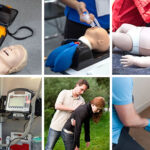Healthcare medical emergency certification is an important credential for medical professionals. It ensures that healthcare workers are well-equipped to handle medical emergencies. It prepares them to provide their patients with the best care and treatment. The certification is intended to give healthcare professionals confidence that they can handle any medical emergency with knowledge and skill. Medical professionals who obtain this certification will gain the skills and knowledge required to properly diagnose, assess, and manage medical emergencies.
Some of the topics covered in healthcare medical emergencies certification are:
- understanding the signs and symptoms of various medical conditions
- administering lifesaving treatments
- managing medical emergencies in both inpatient and outpatient settings
The certification will also equip healthcare professionals with the tools they need to better communicate with their patients and family members. It allows them to make informed decisions in life-threatening situations. With this certification, healthcare professionals will be better prepared to respond to any medical emergency quickly and effectively.
The online CPR AED certification from American CPR Care Association is the right choice for healthcare providers with busy schedules. Our course is flexible and gives freedom from a strict classroom schedule. You can complete the course anytime, anywhere at your pace. It’s nationally accredited with a 98% acceptance rate. Our course is designed and taught by OSHA-certified instructors. The video modules are comprehensive and easy to understand. Get in touch with us and enroll today!
What are the different types of heart-related medical emergencies?
Heart-related medical emergencies can be broken down into two categories:
– Acute: Acute heart-related medical emergencies are those that require immediate medical attention due to their seriousness, such as a heart attack or stroke. Symptoms of a heart attack or stroke include chest pain, shortness of breath, nausea, dizziness, fainting, and cold sweats.
– Chronic: Chronic heart-related medical emergencies are those that require ongoing monitoring and management, such as high blood pressure, obesity, diabetes, and heart failure. Symptoms of these conditions can include shortness of breath during physical activity, feeling tired often, frequent headaches, and swollen ankles or feet. It is important to know the signs and symptoms of both acute and chronic heart-related medical emergencies and to seek medical attention immediately in the event of any of these symptoms.
How can healthcare providers tackle heart-related medical emergencies?
When a medical emergency related to the heart arises, doctors and nurses must act quickly and decisively to provide the best possible care. The first step is to assess the patient’s condition and determine the cause of the emergency. This includes taking a complete medical history, checking vital signs, and conducting a physical examination. The nurse may also order laboratory tests and imaging studies to help with diagnosis.
Once the cause is identified, treatment can begin. This may involve medications, such as nitrates to reduce chest pain, or antiarrhythmic drugs to regulate the rhythm. Other treatments, such as angioplasty or surgery may be needed to restore blood flow or repair damage. The nurse will monitor the patient’s condition and adjust treatment accordingly.
In some cases, cardiopulmonary resuscitation (CPR) may be needed. The nurse must be trained and certified in CPR and familiar with the latest techniques. S/he must be able to perform the procedure quickly and efficiently with minimal risk of injury to the patient.
Finally, it is important to provide emotional support and reassurance to the patient and the family. The nurse should keep them informed of the patient’s condition and help them understand and cope with the situation.
By taking quick action and providing the necessary care, nurses and doctors can help save the lives of those experiencing heart-related medical emergencies.
Certification and recertification with ACCA
The American CPR Care Association provides the most updated and best-in-class CPR certification. You will also earn CE hours after finishing the course. CPR certification is an essential qualification to have if you are a healthcare provider. It is a key part of medical training as it ensures that medical professionals have the knowledge and skills necessary to save lives in an emergency. CPR certification allows healthcare personnel to act quickly and efficiently in a medical emergency, making it a vital skill for any medical professional.
Having CPR certification also helps medical professionals remain current and up-to-date on the latest life-saving techniques. The AHA regularly updates its guidelines for CPR. The American CPR Care Association follows the most recent protocols that help medical personnel maintain the highest standards of care for their patients.
CPR certification provides healthcare professionals with important legal protections, as it demonstrates that they are competent in life-saving techniques and have taken the necessary steps to be prepared for a medical emergency. In many states, healthcare providers must have CPR certification to practice, so it is an important part of any medical professional’s portfolio.
Renewing your CPR certification is important for both safety and professional reasons. It is important to stay up to date on the most current guidelines and best practices, as well as keep your certification current as required by certain professions, such as medical professionals, firefighters, and lifeguards. Renewing your certification also proves to employers that you are staying up-to-date and up to the challenge of performing CPR in case of an emergency.
Additionally, if you are a medical or healthcare professional, your certification is required by law. It is important to stay informed. The CPR techniques change over time, and you want to be sure you are using the most effective techniques. Renewing your certification is also an excellent way to refresh your knowledge and skills and provide yourself with the confidence to act in an emergency.
Conclusion
Overall, a CPR certification is a valuable qualification for any healthcare professional and is essential for providing the highest quality patient care. It is important to stay up-to-date on the latest protocols and procedures so that medical personnel can be prepared to act in an emergency.







